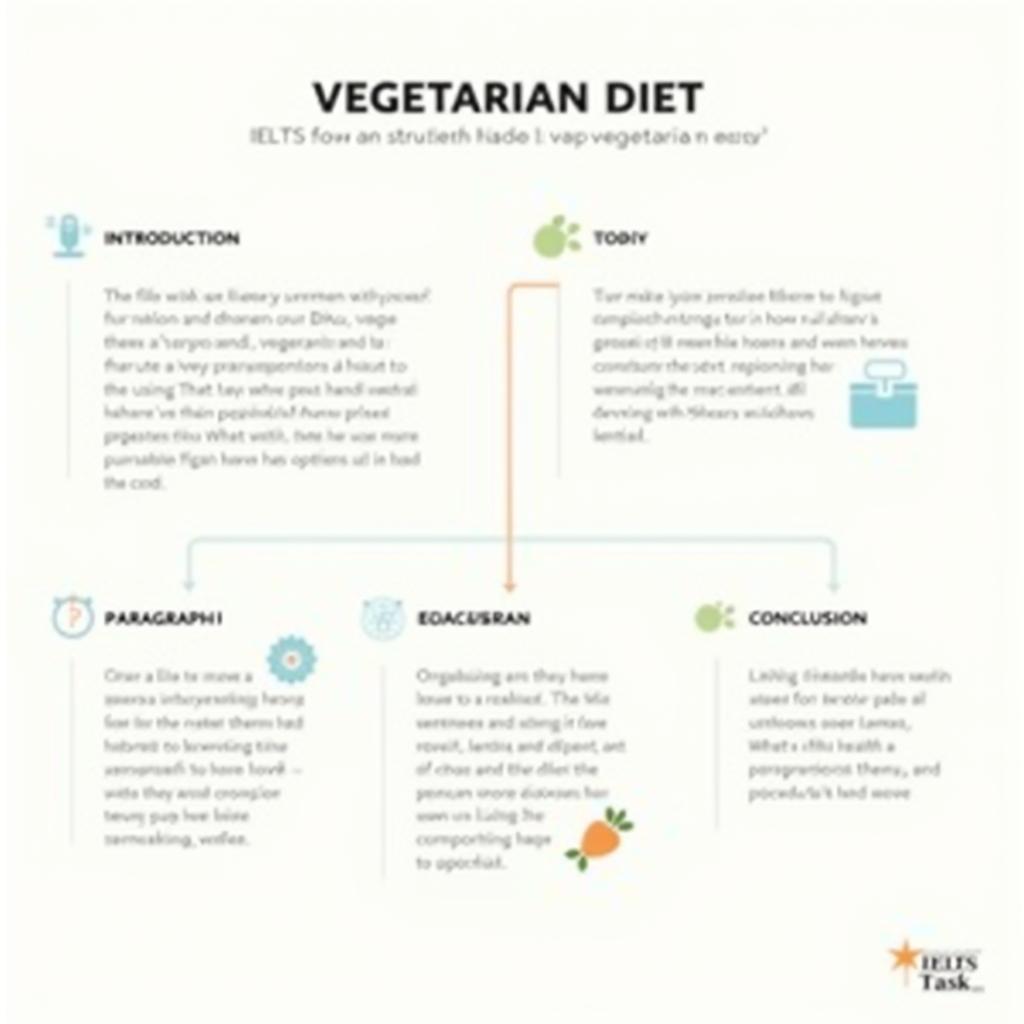Introduction
The benefits of vegetarian diet has become a frequent theme in IELTS Writing Task 2, often framed as an opinion or advantages/disadvantages question about health, ethics, and environmental impact. Examiners use this topic to test your ability to define scope (e.g., “everyone,” “healthy life”), balance evidence, and avoid overgeneralization. In this lesson, you will learn how to approach typical prompts on this theme, see three fully written sample essays (Band 9, Band 7, and Band 5-6) with detailed scoring analysis, build topic vocabulary, and practice high-scoring sentence structures that examiners reward.
You will also see two to three real, previously reported IELTS Task 2 questions on this topic, verified through trusted sources such as IELTS Liz and IELTS-Blog (both of which regularly curate authentic test reports and widely used practice prompts). By the end, you will know exactly what distinguishes a Band 9 essay from a Band 6.5 and how to upgrade your writing in practical steps.
For learners who want extra background knowledge to enrich examples, you may find this related explainer helpful: Similar to how many candidates frame health and ethics arguments, you can explore more about the The benefits of a vegetarian diet.
Verified past Task 2 questions on this topic:
- “Some people believe everyone should become a vegetarian because eating meat is not necessary for a healthy life. To what extent do you agree or disagree?” (Reported by IELTS Liz and IELTS-Blog)
- “Many people think a vegetarian diet is better for individuals and society. Do the benefits of vegetarianism outweigh the drawbacks?” (Reported by IELTS-Blog)
- “Some argue that reducing meat consumption is essential for health and the environment. To what extent do you agree or disagree?” (Reported by IELTS-Blog; aligns with health/environment themes commonly used in official practice materials)
1. Question & Analysis
Some people believe that everyone should become a vegetarian because eating meat is not necessary for a healthy life. To what extent do you agree or disagree?
Analysis:
- Question type: Opinion (agree/disagree). You may completely agree, completely disagree, or give a balanced view, but your position must be clear throughout.
- Key terms:
- “Everyone”: implies universality. If you disagree, show why a universal rule is problematic (e.g., medical needs, cultural contexts).
- “Not necessary for a healthy life”: forces you to discuss nutrition (protein, iron, B12) and whether plant-based sources can meet these needs.
- “Vegetarian”: excludes meat and fish (you can briefly differentiate vegetarian vs. vegan if relevant, but don’t drift off-topic).
- Common pitfalls:
- Overclaiming: “Vegetarian diet is perfect for all.” Examiners penalize absolute, unqualified statements.
- Lack of evidence: Vague claims like “vegetables are healthier” without examples (e.g., legumes, tofu, iron-fortified foods) weaken Task Response.
- Ethical-only focus: Ethics are valid, but the prompt centers on health necessity; balance your arguments.
- Strategic approach:
- Define scope early (health vs. ethics; universal vs. individual).
- Use specific, real-life examples (e.g., lentils and tofu common in Asian diets, B12-fortified foods, medical advice variability).
- Conclude with a clear stance: agree in principle but not universally, or strongly agree, etc.
 IELTS Task 2 vegetarian diet essay structure with thesis and topic sentences
IELTS Task 2 vegetarian diet essay structure with thesis and topic sentences
To connect health benefits with wider environmental reasoning (useful for Body 2 development), this discussion has clear links with whether societies should shift to plant-based diets for environment?
2. Band 8-9 Sample Essay
Band 8-9 essays are precise, well-organized, and demonstrate control over argument, evidence, and language. They avoid exaggeration, use nuanced evaluation, and present a consistent position.
Essay (300 words):
In recent years, plant-forward eating has gained momentum, and many now argue that humanity should abandon meat entirely because it is unnecessary for health. While a well-planned vegetarian diet can sustain excellent well-being, I contend that mandating it for everyone is neither realistic nor medically appropriate.
First, a vegetarian diet can be nutritionally complete when carefully managed. In numerous Asian contexts, people routinely meet protein needs through lentils, soy products, nuts, and seeds, while iron and calcium can be obtained from leafy greens and fortified foods. Moreover, vitamin B12, often cited as a limitation, is available through dairy, eggs, or supplements. These options show that meat is not indispensable for health, provided individuals have access to diverse ingredients, basic nutrition knowledge, and, where necessary, supplementation.
However, insisting that everyone adopt vegetarianism overlooks individual variation and context. People with certain medical conditions, athletes with unusually high energy needs, or communities lacking reliable access to varied plant proteins may find it difficult to thrive without animal products. In remote areas, for instance, seasonal scarcity can make plant diversity—and thus micronutrient sufficiency—hard to achieve. More broadly, food habits are deeply cultural; abrupt, universal change is likely to provoke resistance and could inadvertently lead to poorly planned diets, which are harmful regardless of whether they contain meat.
Ultimately, the question is not whether vegetarian diets can be healthy—they can—but whether they are necessary for all. The evidence suggests a more balanced view: vegetarian eating is a powerful option that many can adopt to improve health and reduce environmental pressure, but it should remain a personal, informed choice, ideally guided by healthcare professionals and supported by food education.
Scoring (estimated):
- Task Response: 9.0
- Coherence & Cohesion: 8.5
- Lexical Resource: 9.0
- Grammatical Range & Accuracy: 8.5
Why this excels:
- Clear, nuanced thesis distinguishes “can be healthy” vs “not necessary for all.”
- Specific examples (lentils, soy, B12, fortified foods) support claims.
- Balanced counterpoints (medical needs, access, cultural factors) show critical thinking.
- Cohesive progression with logical paragraphing and precise referencing.
- Advanced but natural lexis (plant-forward, micronutrient sufficiency, indispensable).
- Controlled hedging for accuracy (“often,” “can,” “ideally”).
- Varied sentence structures, including subordination and non-defining relative clauses.
For candidates who want to deepen the health angle to strengthen Body 1 evidence, see a concise overview of the importance of plant-based diets for health.
3. Band 6.5-7 Sample Essay
At Band 6.5-7, arguments are relevant and mostly well organized, with some lapses in precision or development. Language is generally accurate with occasional awkwardness.
Essay (265 words):
Many people say that we should all stop eating meat because it is not required to stay healthy. I partly agree because a vegetarian diet can work very well for many people, but I do not think it is practical or suitable for everyone.
On the positive side, plant foods provide a wide range of nutrients. In countries like India and Vietnam, families often eat legumes, tofu, vegetables and fruits every day, which can cover protein, fiber and many vitamins. If people plan properly, they can also get iron and calcium from greens and fortified drinks. In addition, B12 can be obtained from dairy or supplements, so meat is not the only option. Therefore, a vegetarian diet can clearly support good health for a large part of the population.
However, making this a rule for everyone is not realistic. Some individuals have higher energy demands, such as competitive athletes, and they might find it harder to reach targets without animal foods unless they receive expert guidance. Also, some places do not have regular access to diverse plant proteins or fortified products, especially in rural or remote areas. In those situations, strict vegetarianism might lead to deficiencies. Finally, food culture matters, and forcing sudden changes can cause people to give up and return to unhealthy habits.
In conclusion, vegetarian diets are often healthy and can be a strong choice, but they should not be mandatory. People should receive nutrition education and make informed decisions that fit their health needs and local conditions.
Scoring (estimated):
- Task Response: 7.0
- Coherence & Cohesion: 7.0
- Lexical Resource: 7.0
- Grammatical Range & Accuracy: 6.5
Comparison with Band 8-9:
- Precision: Band 9 uses nuanced qualifiers (“micronutrient sufficiency”); Band 7 uses simpler terms.
- Evidence depth: Band 9 discusses access, culture, and medical needs in detail; Band 7 is briefer.
- Cohesion: Band 9 shows tighter logical sequencing and precise referencing; Band 7 has good flow but fewer advanced devices.
- Grammar: Band 9 features varied complex structures; Band 7 is mostly complex but safer and less varied.
If your argument needs an environmental angle for development balance, you may find parallels with the debate on the advantages of plant-based diets for personal health, which often intersects with sustainability.
4. Band 5-6 Sample Essay
Band 5-6 essays are often clear in opinion but show limited development, repetitive ideas, or noticeable grammar/vocabulary errors. Below, errors are highlighted and then analysed.
Essay (258 words):
Some people think everyone must be vegetarian because meat is not needed for health. I total agree with this idea because vegetables give all nutrition and meat is very bad for health in general.
Firstly, plants have protein, vitamins and minerals, so we don’t need meat at all in any situations. For example, tofu and beans have protein, and vegetables have iron, so it is enough for anybody. Also, eating vegetarian food will always prevent disease like heart problem and diabetes. People in Asia eat a lot of vegetables, so they are healthier than meat eaters everywhere.
Secondly, meat is unnecessary and also cruel. We can save animals and environment if we stop meat. It is obvious and no need to discuss more. If the government force all citizens to be vegetarian, it will surely reduce hospital costs and pollution.
In conclusion, everyone should be vegetarian because it is always healthy for every person. There is not any reason to eat meat in modern life.
Scoring (estimated):
- Task Response: 5.5
- Coherence & Cohesion: 5.5
- Lexical Resource: 5.5
- Grammatical Range & Accuracy: 5.5
Error Analysis:
| Mistake (excerpt) | Problem | Better version |
|—|—|—|
| “I total agree” | Word form | I totally agree |
| “is very bad for health in general” | Overgeneralization | can be harmful if overconsumed |
| “don’t need meat at all in any situations” | Absolute claim | many people can meet needs without meat |
| “enough for anybody” | Overgeneralization | sufficient for many people |
| “will always prevent disease” | Inaccurate claim | may reduce risk of certain diseases |
| “healthier than meat eaters everywhere” | Unsupported comparison | often associated with positive health outcomes |
| “It is obvious and no need to discuss more” | Tone, cohesion | This suggests potential benefits; however, the issue is complex |
| “If the government force” | Subject-verb agreement | If the government forces |
| “surely reduce” | Over-certainty | is likely to reduce |
How to improve from Band 6 to 7:
- Replace absolutes with hedging (often, can, may, in many cases).
- Add concrete evidence (e.g., B12 from dairy/eggs/supplements; legumes as protein).
- Improve cohesion with clear topic sentences and logical sequencing.
- Vary sentence structures (relative clauses, participle phrases, conditionals) and fix basic grammar errors.
When discussing policy-based arguments in your conclusion or Body 2, you may explore how some propose fiscal measures; for background reading, see debates like whether governments should intervene via a should governments introduce a meat tax to promote vegetarian diets approach.
5. Essential Vocabulary
| Word/Phrase | Type | Pronunciation | Definition | Example | Collocations |
|---|---|---|---|---|---|
| plant-forward | adj | /ˈplænt ˌfɔːrwərd/ | emphasizing plant foods | A plant-forward diet can meet protein needs. | plant-forward diet/approach |
| micronutrient | n | /ˌmaɪkroʊˈnuːtriənt/ | vitamins and minerals needed in small amounts | Micronutrient sufficiency matters in vegetarian diets. | micronutrient sufficiency/deficiency |
| fortified | adj | /ˈfɔːrtɪfaɪd/ | enhanced with added nutrients | Iron-fortified cereals help improve intake. | fortified foods/cereals/drinks |
| supplementation | n | /ˌsʌplɪmənˈteɪʃn/ | adding nutrients via pills/drops | B12 supplementation may be necessary for some. | vitamin supplementation |
| indispensable | adj | /ˌɪndɪˈspensəbl/ | absolutely necessary | Meat is not indispensable for health. | indispensable role/element |
| dietary adequacy | n | /ˈdaɪəˌtɛri ˌædɪˈkwəsi/ | meeting nutrient needs | Dietary adequacy depends on planning. | ensure/assess dietary adequacy |
| evidence-based | adj | /ˈevɪdəns beɪst/ | supported by reliable evidence | Use evidence-based examples in essays. | evidence-based policy/practice |
| cultural inertia | n | /ˈkʌltʃərəl ɪnˈɜːrʃə/ | resistance to change in habits | Cultural inertia can slow dietary shifts. | overcome cultural inertia |
| risk reduction | n | /ˈrɪsk rɪˈdʌkʃn/ | lowering chances of harm | Vegetarian diets may support risk reduction for CVD. | disease risk reduction |
| to mandate | v | /ˈmændeɪt/ | to require officially | Governments should not mandate vegetarianism. | mandate change/policy |
| in many contexts | phrase | /ɪn ˈmɛni ˈkɒntɛksts/ | in various situations | Vegetarian diets work well in many contexts. | NA |
| provided that | linker | /prəˈvaɪdɪd ðæt/ | only if | It is healthy provided that it is planned. | provided that + clause |
| nonetheless | linker | /ˌnʌnðəˈlɛs/ | despite that | Nonetheless, not everyone can switch easily. | nonetheless, however |
| not least | phrase | /nɒt liːst/ | especially | Not least, access to B12 is crucial. | not least because |
| to overstate | v | /ˌoʊvərˈsteɪt/ | to exaggerate | Do not overstate universal benefits. | overstate the case/benefits |
6. High-Scoring Sentence Structures
- Complex subordination
- Formula: Subordinator + clause, main clause.
- Example (from Band 9): While a well-planned vegetarian diet can sustain excellent well-being, I contend that mandating it for everyone is neither realistic nor medically appropriate.
- Why it scores: Balances two ideas, shows nuanced stance.
- Additional examples:
- Although plant foods provide protein, some individuals still require tailored guidance.
- Because access varies, universal rules are problematic.
- Avoid: Misplaced commas; ensure both clauses are complete.
- Non-defining relative clauses
- Formula: Noun, which/who + clause, main clause.
- Example: Vegetarian eating, which many now adopt for health and ethics, should remain a personal choice.
- Why it scores: Adds precise, non-essential info elegantly.
- Additional:
- Iron-fortified products, which are widely available in cities, can help.
- Nutrition education, which is often overlooked, is crucial.
- Avoid: Using “that” in non-defining clauses; comma errors.
- Participle phrases
- Formula: -ing/-ed phrase, main clause.
- Example: Provided with diverse ingredients, many families meet nutrient needs without meat.
- Why it scores: Concise background before main idea.
- Additional:
- Facing limited access, rural households may rely on animal products.
- Informed by evidence, policymakers should avoid mandates.
- Avoid: Dangling modifiers.
- Cleft sentences (It-cleft)
- Formula: It + be + focus + that/who + clause.
- Example: It is a personal, informed choice that best protects long-term health.
- Why it scores: Emphasis adds rhetorical strength.
- Additional:
- It is nutrition education that enables safe transitions.
- It was access to fortified foods that made the shift successful.
- Avoid: Overusing; ensure focus is justified.
- Advanced conditionals
- Formula: If + should/were to, + would/could + base verb.
- Example: If communities were to lack reliable plant diversity, strict vegetarianism could risk deficiencies.
- Why it scores: Sophisticated hypothetical reasoning.
- Additional:
- If athletes should increase training volume, they might need tailored plans.
- If policymakers were to enforce bans, backlash would likely follow.
- Avoid: Mixed conditional confusion.
- Inversion for emphasis
- Formula: Negative adverbials + auxiliary + subject + verb.
- Example: Only with adequate planning can vegetarian diets meet all nutrient needs.
- Why it scores: Advanced control of emphasis and formality.
- Additional:
- Rarely do guidelines consider rural access constraints.
- Under no circumstances should claims be overstated.
- Avoid: Incorrect auxiliary placement or tense agreement.
To extend your evidence bank for environmental justifications in Body 2, you can explore arguments related to a potential societal shift to plant-based diets for environment, which complements health-focused essays.
7. Self-Assessment Checklist
Before writing:
- Identify question type (opinion/advantages and disadvantages/discuss both views).
- Underline scope words (everyone, necessary, healthy life).
- Decide your stance and 2 clear reasons.
While writing:
- Write a precise thesis that reflects scope and stance.
- Use specific examples (legumes, tofu, B12, fortified foods, rural access).
- Hedge appropriately; avoid absolutes.
After writing:
- Check paragraphing: clear topic sentences.
- Replace repeated words with synonyms (adequacy, sufficiency, indispensable).
- Fix grammar hotspots (articles, S-V agreement, conditional forms).
Time management:
- 3-4 minutes: Analyze and plan (outline).
- 25-28 minutes: Write 4 paragraphs.
- 3-4 minutes: Proofread for cohesion and accuracy.
Conclusion
Key takeaways: The benefits of vegetarian diet is a recurring Task 2 theme that tests your ability to argue with nuance. High bands require precise scope control, evidence-based examples (e.g., B12 sources, fortified foods), and balanced treatment of health, access, and culture. Your path to improvement is clear: plan your stance, support with specific examples common in your context (lentils, tofu, leafy greens in Asian diets), and adopt high-scoring structures with accurate grammar.
If you want a quick refresher on health-focused arguments, you can review the importance of plant-based diets for health. For those building Body 1 content, this complementary overview of the advantages of plant-based diets for personal health can supply concrete examples and vocabulary.
Practice by writing your own 260–300-word response to today’s prompt and share it with peers for feedback. With consistent weekly practice, most learners can see a 0.5 band improvement in 6–8 weeks. Continue reading model answers, analyze why they work, and revise your templates accordingly to move steadily toward your target score.


